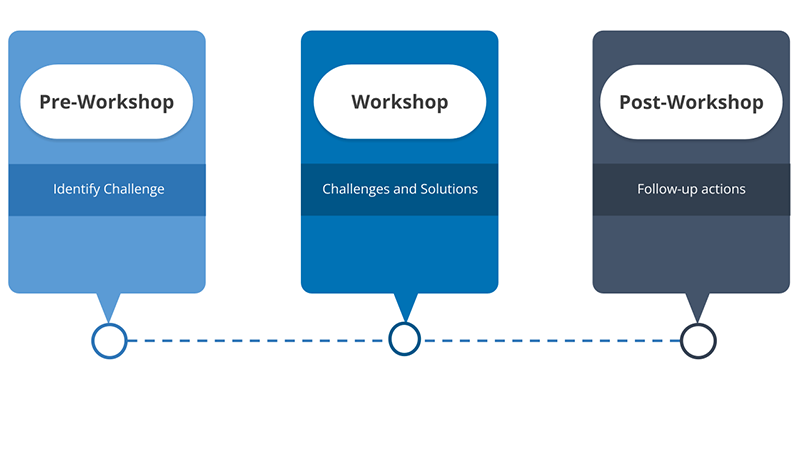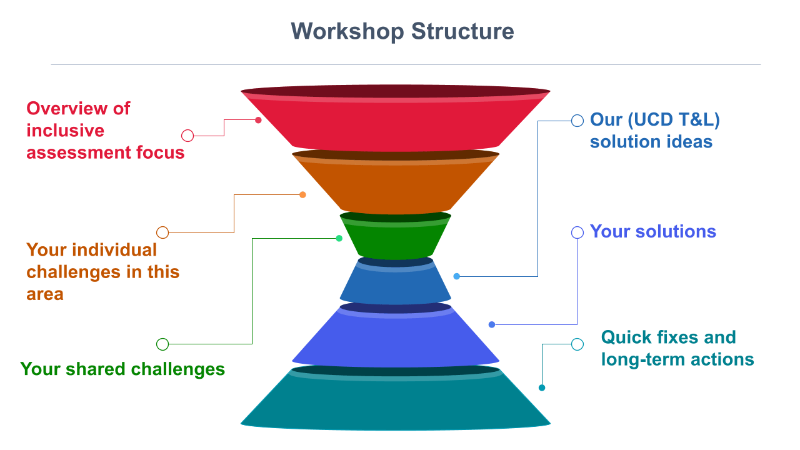Inclusive Assessment
Overview
UCD is committed to the values of equality, diversity and inclusion (EDI). Inclusive assessment is at the centre of fair and equitable education, enabling ‘all students to demonstrate their full potential what they know, understand and can do’ (Hockings 2010, p. 34).
Some key themes and topics associated with inclusive assessment for Schools and programmes include:
- Over-assessment: exploring ways to ensure assessment across programmes is manageable for students and staff alike.
- Choice of assessment: offering choice in assessment can enable students to demonstrate their learning in ways that play to their strengths.
- Diversity in assessment: using different methods of assessment within a module and across a programme provides students with different ways to represent their learning, knowledge and skills.
- Authentic assessment: students perform tasks that demonstrate their to apply specific knowledge or skills to ‘real world’ situations.
- Transparency in assessment: ensuring that students are clear about how they will be assessed and are able to make sense of the criteria by which their work is evaluated.
- Scaffolding assessment: guiding students towards mastery by enhancing assessment tasks through structured support and feedback.
Assessment is a key driver for student learning and empowerment. By creating fair and equitable assessment, Schools and programmes can foster an inclusive environment where all students may thrive.
Please see UCD Teaching and Learning’s Inclusive Assessment and Feedback resources for more information.
Inclusive Assessment Workshop Series for Schools and Programmes
As part of our ongoing commitment to promoting fair and effective assessment practices, UCD Teaching and Learning is offering six Schools and programmes the opportunity to collaborate with us to enhance inclusive assessment in their school/programme in the academic year 2023/24. This involves working closely with School Heads of Teaching and Learning/Programme Directors (or equivalent) to create customised workshops tailored to the specific needs of each school or programme. These workshops will provide valuable insights and practical tools to support the development of more inclusive approaches to assessment.
By engaging with this initiative, your school or programme stands to gain not only the benefits of fostering a more inclusive learning environment but also the opportunity to support your school’s engagement with Quality Review, Professional Accreditation, University for All, Athena Swan and other activities associated with promoting equality, diversity and inclusion (EDI) across the University.
The commitment involves a collaborative three-phase process:
- Phase 1. Pre-workshop: Identify Challenge: actively involve school/programme teams in understanding and identifying the specific needs of their teaching context.
- Phase 2. Workshop: Challenges and Solutions: To explore solutions to those challenges that would suit your local context.
- Phase 3. Post-Workshop: Follow-up actions: To discuss actions and any additional advice for implementing plans for change.

Collaborative Three-Phase Process
Phase One: Identify Challenge
To begin, the School Head of Teaching and Learning/Programme Director (or equivalent) will engage with their respective school/programme teams to identify key inclusive assessment challenges and drivers for change. They will lead in gathering supporting evidence for change, completing an Inclusive Assessment Survey for Schools/Programmes, and meeting with UCD T&L to explore the focus of the subsequent workshop. The total time required to complete these three tasks is estimated to be approximately 4-5 hours.
Phase Two: Challenges and Solutions
Having identified a focus for the school/programme workshop, this customised session will encourage the key stakeholders to explore ideas around inclusive assessment alongside specific challenges, solutions and actions for the school or programme. Key stakeholders could be faculty, staff, educational technologists, students, etc, to ensure a comprehensive and inclusive approach to these discussions. Engagement in this phase should take approximately 1.5 hours to 3 hours. Workshops will be scheduled at a time and modality (online or face-to-face) convenient to the School/programme team.

Phase Three: Follow-up actions
Following the completion of phase two, teams will have the opportunity to engage in debrief sessions with the T&L workshop facilitators. These sessions will offer resource support and act as a bridge to other necessary assistance that may arise from the discussions and actions agreed at the workshop. The debrief sessions can occur in both the short term (soon after the completion of the workshop), and in the longer term as plans emerge. The time commitment for this phase will be flexible and tailored to the specific needs of each team.
As a component of this project, members of UCD Teaching and Learning are conducting research to develop an institutional understanding and implementation framework for Inclusive Assessment. During the workshops, early drafts of the framework will be used, and the processes and outputs will be used to in form a wider understanding of Inclusive Assessment. We will invite workshop participants to actively engage in this research and permission will be sought from those who wish to participate in the study.
How to Get Involved
If you’re a faculty member, staff, student or educational technologist and would like your school or programme to get involved, please discuss this with your School Head of Teaching and Learning/Programme Director (or equivalent). Should your school/programme wish to participate in the Inclusive Assessment Workshop Series, the School Head of Teaching and Learning/Programme Director (or equivalent) will proceed by completing the Expression of Interest Form to start the process. After your form has been reviewed, a member of UCD T&L will be in touch to start the process.
The first Call for Participation will close on Monday 16 October 2023. Please send any queries related to the call to sheena.hyland@ucd.ie.
References
- Hockings, Christine. 2010. Inclusive Learning and Teaching in Higher Education: A Synthesis of Research. EvidenceNet, Higher Education Academy.
- UCD Teaching & Learning (2023) Inclusive Assessment and Feedback